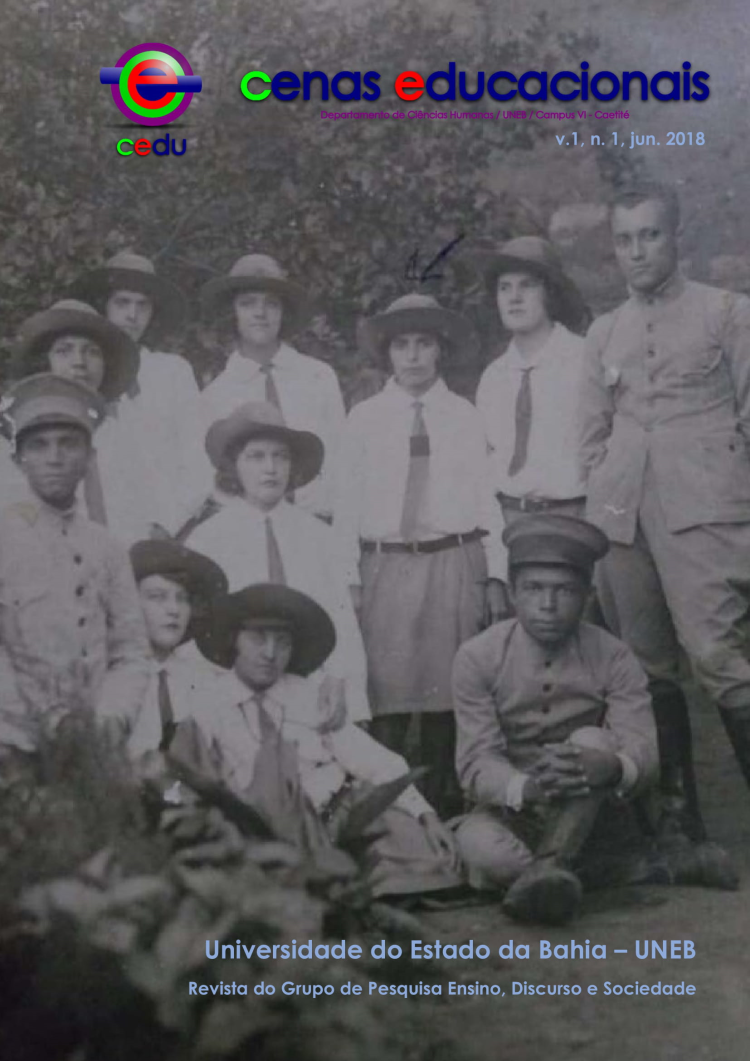MEMÓRIAS SUBTERRÂNEAS EM CRÔNICAS DE ENEIDA
Palavras-chave:
Eneida. Memória Subterrânea. Resistência Política.Resumo
Este artigo é parte de um programa de pesquisa que estuda e desenha Cartografias Poéticas da Amazônia, desenvolvido no Núcleo de Pesquisa Culturas e Memórias Amazônicas. A composição deste traço do mapa compreende o estudo das memórias subterrâneas presente em crônicas da escritora paraense Eneida de Moraes. De cunho bibliográfico e qualitativo, a pesquisa discorre acerca das principais concepções de memória, dentre elas a memória subterrânea, referente aos excluídos e marginalizados socialmente. As memórias trazidas nas crônicas denunciam os abusos da política brasileira dos anos 30 do século XX, as injustiças sociais ocorridas no período da ditadura militar e as prisões vividas pela escritora e seus companheiros. Desta forma, o estudo das poéticas nos permite compreender a memória coletiva da sociedade no período do Estado Novo, ter consciência dos acontecimentos que norteiam o tempo presente, e, assim, projetar perspectivas para o futuro. Compreende-se, então, o papel social da literatura, o que passou despercebido pela memória oficial, vem à tona no texto memorialístico, que fala de assuntos relacionados aos traumas, torturas e prisões enfrentados pelos opositores ao governo de Getúlio Vargas. O presente texto recorta do trabalho maior a apresentação de crônicas dos livros Aruanda e Banho de Cheiro e divide-se em duas partes: a primeira apresenta traços biográficos da vida da escritora, essenciais para a compreensão da obra, e a segunda conta sobre as memórias referidas em crônicas da escritora.
Downloads
Referências
ANSARA, Soraia. Políticas de memória x políticas do esquecimento: possibilidades de desconstrução da matriz colonial. Psicologia política. São Paulo, n.24, v.12, p.297-311, maio – ago, 2012. Disponível em:< http://pepsic.bvsalud.org/pdf/rpp/v12n24/ v12 n24a08.pdf >Acesso em: 27 abr. 2017.
CAETANO DOS SANTOS, Robson. Escudo de Perseu: as estratégias de narrar o trauma nas crônicas de Eneida de Moraes sobre a ditadura de Getúlio Vargas. Revista ContraPonto, Belo Horizonte, n.7, v.5, p.129-142, 2º sem. 2015. Disponível em: <http://periodicos.pucminas.br/index.php/contraponto/article/view/11162 > Acesso em: 10 mar. 2017.
ENEIDA. Cão da madrugada. 2.ed. Rio de Janeiro: Livraria José Olympio, 1955.
____. Caminhos da terra: URSS, Tchecoslováquia. China. Rio de Janeiro: Antunes Livreiros e Editores, 1959.
____. Eneida: depoimento [1967]. Entrevistadores: Dalcídio Jurandir e Miécio Tatti. João Carlos Pereira, organizador. Belém: Unama, 2006.
____. Aruanda / Banho de cheiro. Belém: SECULT; FCPTN, 1989.
FARES, Josse. Eneida, o matiz social num tecido de lirismo. In: Asas da Palavra – Revista de Letras. Belém: Unama, 1993.
____. De Porongas, cestos e palavras: vozes de ensinar e aprender. Belém: s/e., 2012.
GUTIERREZ, Maria Veneranda. Eneida Mulher... In: Asas da Palavra – Revista de Letras. Belém: Unama, 1993.
MOURA, Lucyrene Aranha. Viajando com a linguagem de Eneida. In: Asas da Palavra – Revista de Letras. Belém: Unama, 1993.
ORLANDI, Eni Puccinelli. Maio de 1968: os silêncios da memória. In: Papel da Memória. Pierre Achard et al. Tradução e introdução José Horta Nunes. Campinas, São Paulo: Pontes, 1999.
____. As formas do silêncio: no movimento dos sentidos. 6.ed. Campinas, SP: Editora da UNICAMP, 2007.
POLLAK, Michael. Memória, esquecimento, silencio. Tradução de Dora Rocha Flaksman. Estudos Históricos, Rio de Janeiro, v.2, n.3, 1989, p.3-15.
SANTOS, Eunice Ferreira dos. Eneida de Moraes: militância e memória. In: Em tese. Portal de periódicos da faculdade de Letras da UFMG. Belo Horizonte, v.9, p.99-106, dez. 2005. Disponível
em: <http://www.periodicos.letras.ufmg.br/index. php/ emtese /article/view/3539 >. Acesso em:
maio. 2017.
____. Eneida de Moraes: Tons e Semitons do Exílio. In: Seminário Internacional Fazendo Gênero 7: Gênero e Preconceitos. Universidade Federal de Santa Catarina, 28, 29 e 30 de agosto de 2006. Disponível em: < http://www.fazendogenero.ufsc.br/7/
artigos/E/Eunice_Ferreira_dos_Santos_19.pdf > Acesso em: 01 out.2017.
____. Nas tramas da memória: a cronista e militante Eneida de Moraes. In: Estudos de Literatura Brasileira Contemporânea, nº. 32. Brasília, julho-dezembro de 2008, p. 69-76. Disponível em:
http://periodicos.unb.br/index.php/ estudos/article/view/1999 > Acesso em: 14 maio. 2017.
SELIGMANN-SILVA, Márcio. História, Memória, Literatura: o testemunho na era das catástrofes. Campinas, SP: Editora UNICAMP, 2003.
Publicado
Como Citar
Edição
Seção
Licença
Direitos Autorais
A submissão de originais para a Cenas Educacionais (CEDU) implica na transferência, pelas(os) autoras(es), dos direitos de publicação. Os direitos autorais para os manuscritos publicados nesta revista são das(os) autoras(es), com direitos da CEDU sobre a primeira publicação. As(os) autoras(es) somente poderão utilizar os mesmos resultados em outras publicações indicando explicitamente a CEDU como o meio da publicação original.
Licença Creative Commons
Exceto onde especificado diferentemente, aplicam-se à matéria publicada neste periódico os termos de uma licença Creative Commons Attribution-ShareAlike 4.0 International License, que permite o uso irrestrito, a distribuição e a reprodução em qualquer meio desde que a publicação original seja corretamente citada.






 Esta obra está licenciada com uma Licença
Esta obra está licenciada com uma Licença 